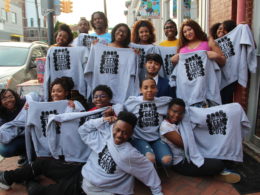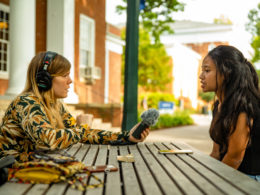Grants. A vital part of the nonprofit ecosystem and the fuel behind many of the most impactful and effective programs offered by any organization. Everyone loves them, but not everyone knows how to win them. Philip Deng is all too familiar with this dilemma. That’s one of the reasons he started Grantable, a platform that connects grant seekers with grant experts.
Now that Grantable has officially launched, The Phil decided to sit down with Deng and discuss how his idea came to fruition and what makes it so special.
Let’s start with your background and how you initially got into the world of grant writing.
I graduated in 2008 from Tufts University. I would say many of the things that I’m applying to my work now, I picked up during a 14- or 15-year career, mostly in the nonprofit sector. I also spent many years abroad. I was in the Marshall Islands and China doing nonprofit work of all kinds. But my father and stepmother live in Seattle. That’s where I went to high school. And so, I moved there when I came back to the U.S., I did some community organizing and started a nonprofit and worked at another one. That’s where I picked up my experience with grants and eventually became a freelancer which led directly to Grantable.
You’ve talked in the past about some of the pushback or frustration you encountered trying to win grants early on in your career. Did those experiences motivate you to start Grantable? What was behind that?
I think there are a number of factors. I was 25 or 26 when I decided I would try to start my own nonprofit. The idea there was to take the community organizing knowledge I’d gained, and instead of organizing for a particular policy or political purpose, I wanted to try to help the community build a new public market where immigrant and refugee food entrepreneurs could set up stalls. That was really inspired by my time working abroad and just loving the street markets. As a really young and inexperienced entrepreneur at the time, I looked at myself then as a good example of the people that we’re trying to help now with Grantable, people who are full of inspiration and determination to do something positive.

When you start something like a nonprofit, it’s really a lot of work and a lot of different moving parts. Grants can be an excellent way to help you get started. However, grants are really tough to find. They can take a lot of time, and if you don’t know what you’re doing, it can be an uphill battle. I wish I had been connected with more resources and more people when I was starting my nonprofit, so that I could have known where to apply, how to apply, how to go about the process efficiently. So, that’s what we’re trying to connect people with today. We have freelance experts all across the country who can help smaller upstart organizations take the amazing narrative, work and data that they have and turn them into grant funds.
Just what attracted you to Richmond? Did you already have connections here?
My partner Anitha and I didn’t have any ties to the Seattle area. We were both freelancing and then she got a job offer out here in Richmond, and we were actually on a road trip in our camper van at the time. She got the offer, and we just decided, on a forest road in Oregon: “Let’s try Richmond.”
[Anitha] had been researching cities of about Richmond’s size with a cool scene and proximity to other interesting metro areas. We were both just sort of up for an adventure. What we didn’t anticipate was arriving in March of 2020.It was a very, very surreal time…We’ve now really have come to love and appreciate Richmond, but at the same time, we’ve only ever known it during the pandemic. So, we realize that there’s a whole other side to it that we haven’t experienced.
That had to have been a bizarre introduction to the city. Did arriving in Richmond during lockdown give you more time to work on the idea that ultimately became Grantable?
Initially, I wasn’t thinking of starting a company. I was writing grants as a freelancer. That was how I was earning income. I had really geared my life to be van-based. I had been working for several years to acquire a [camper] van and build it out. My dream was to take it down to Patagonia in South America.
Freelance grant writing was going to be my way of earning an income to power the trip. Obviously, all that changed. But I had gained some clients and was doing work with people I really liked working with. I did have a lot of time on my hands due to the pandemic. The first thing I did was take this hack I had developed to write grants faster using Trello to repurpose proposal parts and come up with drafts very efficiently. And I wondered if I could actually create a piece of software that was built for that specific purpose. So, that’s what I did. I used a no-code platform called Bubble.
Basically, I took the principle behind the Trello hack and made a piece of software. Anitha shared another neat newsletter with me about Idea Factory with Startup Virginia. I applied and told them about my idea. I ended up getting into an amazing program there that allowed me to get out and talk to strangers about their grant needs, professionals all across the country. That research gave me the inspiration to start a company. Then I applied to Lighthouse Labs and 757 Accelerate in Norfolk as well. All of those programs were enormously helpful. They gave us our first funding, provided mentorship and gave me enough time to experiment, learn and grow. So, that’s the path we’ve taken.
Did you have much experience in software development or coding? Were any of the methods you used to design the tool self-taught?
It was all self taught. I started out by talking to some software engineer friends of mine, and I was initially very overwhelmed by how much money and time is required to build something like I was envisioning. And also, the challenge of not having any technical background. Then I found Bubble and was delighted by what you could do with it. I enjoyed building these real websites that were clickable and could process data. Once I understood what Bubble was, I could see essentially see my way to a prototype.
To find out how Grantable got to where it is today, read Part II on Feb. 16.
To support Grantable and use the platform, visit its website here. You can also follow the company on Facebook and Twitter.










